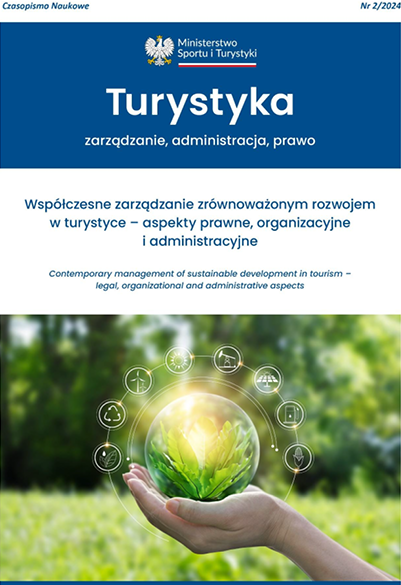Pomiar zrównoważonego rozwoju turystyki – cel i koncepcja
Keywords:
sustainability, tourism, statistical framework, indicatorsAbstract
mainly depends on – apart from the necessary tourism infrastructure facilities – an intact and unsoiled nature and picturesque landscapes. Therefore, a high quality of the natural and social environment is one of the most important production factors of tourism industry, as tourists want to move to attractive and unpolluted places which are one of the main travel purposes.
In many regions and countries sustainable tourism policies are more or less well developed; however, there is still a lack of guidance and information on how to monitor this progress. Given its economic, social and environmental implications and its potential for growth, tourism plays, and will continue to play, a major role in our societies.
Considering this fact, the development of tools measuring the economic, social and ecological sustainability applicable to the tourism industry was initiated by various (national and international) organizations and proposed for implementation.
Based on the “UN 2030 Agenda” (see UN 2015), the UN World Tourism Organisation (UNWTO, now “UN Tourism”; see UNWTO 2017a) - one of the leading international organisations dealing with tourism and tourism statistics - has set itself the goal of measuring sustainable tourism as part of a specially defined project “Measuring the Sustainability of Tourism” (MST; see UNWTO 2017b) and a multidisciplinary Expert Group on MST12 has been set up jointly with the UN Statistics Division (UNSD). The need for statistical analysis of the topic stems from the increasing realization that tourism - beyond its links with the economy - has an impact on the environment and society in general.
A pre-condition for MST is the development of a common accepted statistical framework which aims to provide an internationally agreed statistical tool to measure the impacts and dependencies of tourism on the economy, society and the environment. Therefore, a “Statistical Framework for Measuring the Sustainability of Tourism” (SF-MST; see UNWTO 2023a) has being developed by UNWTO in partnership with leading countries, and with the support of the UNSD, the International Labour Organization (ILO) and others. Work is being led by the Expert Group on MST under the auspices of the UNWTO Committee on Statistics13. After the “Global Consultation Process” in October/November 2023 the Framework is going to be sent to the UN Statistical Commission14 (UNSC) for its endorsement through the Commission.
The document is structured as follows: after the introduction and the rationale of the document, the second section provides an overview of the steps developing the SF-MST; the third section shows the underlying concepts of SF-MST. The fourth section gives insights related to the purpose of developing a SF-MST; before concluding the fifth part provides some thoughts related to potential indicators measuring the sustainability of tourism.
The document is mainly based – among others - on the Draft SF-MST (see UNWTO 2023a), the presentation held on 26 October 2023 at Vistula University Group (see Laimer 2023) and the keynote paper presented at the Manila Conference in 2017 (see Laimer 2017).
Downloads
References
BMAW (Federal Ministry Republic of Austria Labour and Economy) (2018) “Plan T – Masterplan for Tourism” Available at https://www.bmaw.gv.at/dam/jcr:0ea14456-ac84-4d66-ac69-d507317cd3f2/PLAN%20T%20-%20MASTER%20PLAN%20FOR%20TOURISM.pdf (Accessed: 3 December 2023).
Laimer (2017) “Tourism Indicators for Monitoring the SDGs”. Central Paper presented at the 6th UNWTO International Conference on Tourism Statistics, 21-24 June 2017, Manila/Philippines.
Laimer (2023) “Tourism Indicators for Monitoring the SDGs. Underlying methods, concepts and challenges”. Presentation held at Vistula University Group, Warzawa/Poland on 26th October 2023 at the Conference: Impact of tourism on sustainable development of countries and regions.
UN (2009) System of National Accounts 2008. Elaborated by United Nations, the European Commission, the Organisation for Economic Co-operation and Development, the International Monetary Fund and the World Bank Group. Available at https://unstats.un.org/unsd/nationalaccount/docs/SNA2008.pdf (Accessed: 27 December 2023).
UN (2014) System of Environmental-Economic Accounting 2012. Central Framework. Elaborated by United Nations, European Union, Food and Agriculture Organization of the United Nations, International Monetary Fund, Organisation for Economic Co-operation and Development, The World Bank. Available at https://unstats.un.org/unsd/envaccounting/seearev/seea_cf_final_en.pdf (Accessed: 27 December 2023).
UN (2015), Transforming our world: the 2030 Agenda for Sustainable Development, Resolution adopted by the General Assembly on 25 September 2015. Available at https://documents-dds-ny.un.org/doc/UNDOC/GEN/N15/291/89/PDF/N1529189.pdf?OpenElement (Accessed: 21 December 2023).
UNWTO (2010a) “International Recommendations for Tourism Statistics”. Studies in Methods, Series M No.83/Rev.1. Available at https://unstats.un.org/unsd/publication/Seriesm/SeriesM_83rev1e.pdf (Accessed: 27 December 2023).
UNWTO (2010b) “Tourism Satellite Account: Recommended Methodological Framework 2008”. Elaborated by UN, UNWTO, Eurostat and OECD. Studies in Methods, Series F No.80/Rev.1. Available at https://unstats.un.org/unsd/publication/Seriesf/SeriesF_80rev1e.pdf (Accessed: 27 December 2023).
UNWTO (2017a) “2017 International Year of Sustainable Tourism for Development”. Available at https://www.unwto.org/tourism4development2017 (Accessed: 6 December 2023).
UNWTO (2017b) “Measuring the Sustainability of Tourism”. Available at https://www.unwto.org/tourism-statistics/measuring-sustainability-tourism (Accessed: 21 December 2023).
UNWTO (2020) “Experiences from Pilot Studies in Measuring the Sustainability of Tourism – A Synopsis for Policy Makers”. ISBN: 978-92-844-2403-0. Available at https://www.e-unwto.org/doi/epdf/10.18111/9789284424047 (Accessed: 27 December 2023).
UNWTO (2022) “Measuring the Sustainability of Tourism – Learning from Pilots”. ISBN: 978-92-844-2405-4. Available at https://www.e-unwto.org/doi/epdf/10.18111/9789284424061 (Accessed: 27 December 2023).
UNWTO (2023a) “Statistical Framework for Measuring the Sustainability of Tourism (SF-MST)”. Draft prepared for Global Consultation October 2023. Available at https://webunwto.s3.eu-west-1.amazonaws.com/s3fs-public/2023-10/SF-MST_complete_version_OCT2023_cover03.pdf (Accessed: 6 December 2023).
UNWTO (2023b) Report of the World Tourism Organization on tourism statistics. Note by the Secretary-General at the 55th UN Statistical Commission, 27 February – 1 March 2024. Available at https://unstats.un.org/UNSDWebsite/statcom/session_55/documents/2024-17-TourismStats-EE.pdf (Accessed: 20 December 2023).
UNWTO (2023c) “Measuring the Sustainability of Tourism (MST): Proposals for a set of indicators. Draft prepared for discussion at the 4th Meeting of the Expert Group on Measuring the Sustainability of Tourism, September 2023”. Available at https://webunwto.s3.eu-west-1.amazonaws.com/s3fs-public/2023-09/MST_Indicators_EG_version_Sep2023_13092023_REV1.pdf (Accessed: 18 December 2023).



